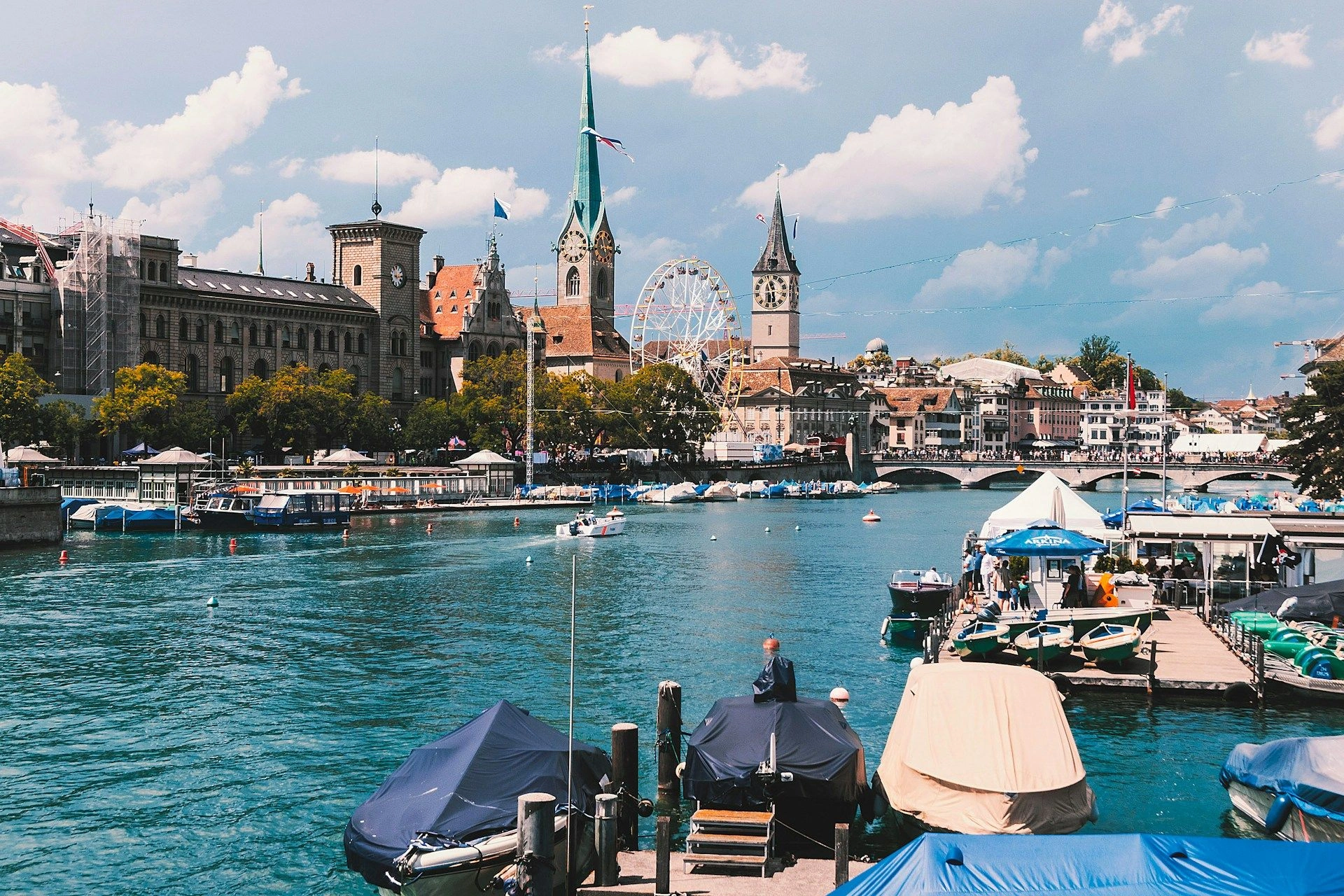Permanent Residency by Investment in SwitzerlandStable residency with world-classhealthcare and EU access

Advantages of residence
permit in Switzerland
Lump-Sum Taxation Option
Foreign nationals can negotiate a flat cantonal tax based on living expenses rather than income—simplifying compliance, optimizing tax efficiency, and ensuring predictable annual costs.
World-Class Healthcare System
Switzerland boasts universal, high-quality healthcare with both public and private insurers—residents access cutting-edge hospitals, specialists, and comprehensive coverage without long waiting times.
Central European Mobility
With a Swiss residence permit, you travel visa-free across Schengen countries and benefit from Switzerland’s extensive rail and air networks linking to major EU capitals.
Lump-Sum Taxation Option
Foreign nationals can negotiate a flat cantonal tax based on living expenses rather than income—simplifying compliance, optimizing tax efficiency, and ensuring predictable annual costs.
World-Class Healthcare System
Switzerland boasts universal, high-quality healthcare with both public and private insurers—residents access cutting-edge hospitals, specialists, and comprehensive coverage without long waiting times.
Central European Mobility
With a Swiss residence permit, you travel visa-free across Schengen countries and benefit from Switzerland’s extensive rail and air networks linking to major EU capitals.

Useful articles
and recommendations from experts
Residence and Citizenship in Switzerland
Why people seek residence and citizenship in Switzerland
Switzerland’s reputation for political stability, high living standards, and strong economy makes it a top destination for those pursuing a residence permit in Switzerland and eventual citizenship pathways. Globally recognized for banking secrecy, innovation clusters in Zurich, Geneva, and Basel, and the prestigious Swiss education system, the country attracts high-net-worth individuals, entrepreneurs, retirees, and families. Expatriates benefit from Schengen area visa-free travel, allowing them to move freely within 26 European countries. Switzerland’s decentralized federal structure grants each canton authority to offer tailored residency programs—such as lump-sum taxation for wealthy residents, self-employment permits, and investor-type authorizations—ensuring flexible entry routes for different profiles. Over time, holders of B-type permits may qualify for permanent C-permits after five to ten years, subject to integration criteria like language proficiency and community participation, and eventually apply for Swiss citizenship by naturalization under cantonal and federal regulations. The convergence of fiscal advantages, high-quality infrastructure, pristine environment, and EU-adjacent mobility cements Switzerland’s allure for global citizens seeking residence and citizenship in Switzerland.
Types of residence permits and citizenship programs
Switzerland offers several pathways for non-EU/EFTA nationals to secure a residence permit in Switzerland:
- B-Permit (Temporary Residence): Issued for one year and renewable annually for employees with Swiss work contracts, self-employed individuals, and those qualifying for lump-sum taxation. Requires proof of stable income, local accommodation, and health insurance.
- L-Permit (Short-Term): Granted for short assignments up to one year, primarily for cross-border employees and project-based roles; limited renewals.
- C-Permit (Permanent Residence): Available after five years of uninterrupted residence (EU/EFTA nationals) or ten years for other foreigners. Requires successful integration, language skills (usually A2 for German/French/Italian), and compliance with Swiss laws.
- Lump-Sum Taxation Agreement: Cantonal schemes permit wealthy individuals to negotiate a flat tax based on annual living expenses (seven-year minimum stay) in exchange for residence without work rights, popular among retirees and passive investors.
- Investor & Self-Employment Routes: Cantons may grant residency to significant investors or self-employed entrepreneurs who commit to economically beneficial projects—creation of jobs, capital investment, or innovative ventures under local approval.
- Citizenship by Naturalization: After obtaining a C-permit and fulfilling residence requirements—typically 10 years in total, language proficiency (B1), successful civic integration, and clean record—foreigners may apply for Swiss citizenship at the municipal, cantonal, and federal levels, culminating in a Swiss passport and full EU-adjacent mobility rights.
Requirements and application process
Applicants must prepare documentation demonstrating financial stability, suitable accommodation, and integration intent. Standard requirements for a B-Permit include:
- Valid passport and visa for entry (if required);
- Signed employment or service contract, or proof of sufficient funds (for non-working applicants);
- Lease agreement or property ownership certificate in the chosen canton;
- Comprehensive Swiss health insurance policy;
- No-criminal record certificate, apostilled and translated if necessary;
- Application form submitted to the cantonal migration authority.
Lump-sum taxation candidates additionally present detailed asset statements, minimum stay commitment (90 days/year), and negotiate terms with cantonal tax authorities. Processing times vary by canton, ranging from 4 to 12 weeks. Upon permit approval, holders must register at the local commune (Gemeinde, commune, comune) within 14 days of arrival to finalize residency. Permit renewals hinge on continued compliance—proof of income or asset maintenance, health insurance, and adherence to local regulations—for which renewal notices are sent three months before expiry.
Legal framework and government policies
Switzerland’s immigration and naturalization processes are governed by:
- Federal Act on Foreign Nationals and Integration (FNIA): Defines permit categories, quotas, and integration requirements.
- Ordinance on Admission, Residence and Employment (VZAE): Details procedural rules for granting and renewing permits.
- Federal Act on Direct Federal Taxation: Contains provisions for lump-sum taxation agreements for wealthy residents.
- Cantonal Tax Laws: Each canton enacts its own tax regulations under the federal framework, setting minimum taxable base, annual payments, and eligibility criteria.
The State Secretariat for Migration (SEM) oversees federal policy, quotas, and cross-cantonal coordination, while cantonal migration offices handle applications, enforce integration checks, and liaise with federal authorities. Periodic updates to bilateral treaties between Switzerland and EU member states regulate cross-border commuting (G-Permits) and quota adjustments to balance labor market needs with social integration goals.
Lifestyle, mobility, and long-term benefits
Residency in Switzerland unlocks exceptional lifestyle advantages:
- High Quality of Life: Switzerland consistently ranks atop global livability indices, boasting low crime rates, efficient public transport (trains, trams, buses), and world-famous cleanliness and safety standards.
- Healthcare & Education: Universal health coverage ensures access to cutting-edge medical care at public and private hospitals. International schools and renowned universities—ETH Zurich, University of Geneva—cater to expatriate families and academic professionals.
- Environmental Excellence: Alpine landscapes, pristine lakes, and protected natural parks support outdoor recreation—skiing, hiking, sailing—while strict environmental regulations maintain air and water purity.
- Economic Stability: As home to global finance, luxury watchmaking, pharmaceuticals, and precision manufacturing, Switzerland offers stable employment. Multinational headquarters in Zurich, Basel, and Geneva attract skilled talent and offer world-class salaries.
- Mobility: Although not an EU member, Switzerland participates in the Schengen Agreement—residence permit holders travel visa-free across Schengen-area countries for up to 90 days per 180-day period, facilitating business and leisure travel across Europe.
- Tax Predictability: Cantonal sovereignty over taxation creates competitive regimes; lump-sum residents benefit from known fixed annual liabilities, while employed permit holders leverage progressive federal and cantonal income tax rates.
How VelesClub International helps
VelesClub International provides end-to-end, personalized support for clients seeking residence and citizenship in Switzerland:
- Eligibility Assessment: We evaluate financial profiles, investment capacity, employment contracts, and lifestyle goals to identify the ideal permit category and canton.
- Application Coordination: Preparation and submission of all required documents—employment contracts, asset statements, criminal records, health insurance certificates—to federal SEM and cantonal migration offices.
- Lump-Sum Tax Negotiation: Liaison with cantonal tax authorities to structure and finalize favorable lump-sum agreements, including calculation of taxable base and annual payment schedules.
- Integration & Relocation: Assistance with local registrations, language-course placement, school enrollment, real-estate sourcing, and community integration to ensure smooth transition.
- Permit Renewals & Naturalization: Ongoing compliance monitoring, renewal application management, and guidance through the naturalization process—municipal, cantonal, and federal—to achieve permanent residence and second passport in Switzerland ambitions.
Leveraging deep Swiss expertise, strong cantonal relationships, and a proven track record, VelesClub International ensures a seamless, efficient, and fully tailored journey to secure residence permits and pursue citizenship pathways in Switzerland—empowering clients to enjoy unparalleled stability, mobility, and quality of life in the heart of Europe.







